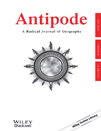 From two scholars at the University of Queensland, Australia and posted online by the radical geography journal, Antipode. The article serves to situate Murray Bookchin’s theory of dialectical naturalism within the broader dialectical tradition and highlight Bookchin’s unique contributions to the evolution of dialectical thought. It offers an important contrast with Herbert Marcuse’s influential approach to dialectics, which in the authors’ view is undermined by Marcuse’s technological pessimism and relatively late consideration of ecology.
From two scholars at the University of Queensland, Australia and posted online by the radical geography journal, Antipode. The article serves to situate Murray Bookchin’s theory of dialectical naturalism within the broader dialectical tradition and highlight Bookchin’s unique contributions to the evolution of dialectical thought. It offers an important contrast with Herbert Marcuse’s influential approach to dialectics, which in the authors’ view is undermined by Marcuse’s technological pessimism and relatively late consideration of ecology.

Here are 3 excerpts. The abstract is available here, but the article is unfortunately behind a paywall. If your own library does not have a subscription, the article should be obtainable via interlibrary loan. Full citation is Shannon Brincat and Damian Gerber, “The Necessity of Dialectical Naturalism: Marcuse, Bookchin, and Dialectics in the Midst of Ecological Crises,” Antipode (in press), doi: 10.1111/anti.12140.
… The attempt to understand the objective reality of the ecological crisis requires an awareness of the dialectical contradictions of history—especially in the relation between human beings and their natural environs. Fortunately, Bookchin’s notion of a “dialectical naturalism” offers a unique means for us to comprehend the rational potentialities in “the real” which bourgeois civilisation has cast aside, denied, or left unrealised. This aims at the restorative relation between human “second nature” and biological “first nature” (Bookchin 1999). However vaguely Bookchin may have formulated his concept of dialectical naturalism, it nonetheless evokes the glimmer of the hidden possibilities of a more rational relation between human social organisation and the natural world. It is, as Marcuse maintained somewhat inconsistently, only through the nuances of dialectical thought that “naturalism” may be emancipated from its degraded status as a mere object of ideology.
… Bookchin’s magnum opus, The Ecology of Freedom, is an attempt to explore such alternative, liberatory pathways through a dialectical analysis of the relationship between natural and human history. Whilst an account of its nuances and leitmotifs cannot possibly be given here, its dialectical historicism aims to actualise the potentialities of history rather than merely producing the “facts” as in the positivist tradition and its “truths” that are vulnerable to ideological capture. Much like Hegel’s Phenomenology of Spirit and Benjamin’s The Arcades Project, its overall concern is to present an analysis of the movement of history (in Bookchin’s case, of the hierarchical relation between human domination and the domination of nature leading up to the ecological crisis) without becoming confined within the ideological categories through which this movement has become understood in “official history” (Bookchin 1982:65). It presents an introjection of naturalistic and dialectical philosophy: an attempt to document and give voice to the possibilities of an inter- related first and second nature. At the same time, it also connects the failure of revolutionary movements of the past to the degraded actuality of the present, especially the concrete social factors underlying the ecological crisis (hierarchy, class, patriarchy, and the emergence of capitalism). Here, Bookchin’s more dynamic treatment of class (inclusive of women, youth, disenfranchised) is quite different to Marcuse’s, its wider basis bringing with it a more adequate conceptualisation of totality and relations therein. This more adequate ontological commitment allows Bookchin to see ecological problems as the product of the domination of people by people, as part of the same pathology of hierarchy.7 Stated positively, it is in these ways that Bookchin’s approach gestures to the radical possibility contained within a dialectic that grasps human and nature as an affinity.
… Our age of ecological crises has propelled dialectical analysis into a higher stage of truth. As posited by Bookchin, the pressing reality of global crises has obliged us to overcome the one-sidedness of earlier conceptions of the dialectic which took for granted the necessity of the domination of nature in the “progress” of history. The great limitation with the Hegelian dialectical tradition—indeed, German ideal- ism—has always been its assumed separation between nature and Reason.12 The potentialities of true humanism lie, however, in the environmental conditions of its becoming. A liberated humankind, with its accompanying “second nature”, actualises itself through “first nature” without reducing it into its own self-image: thus the dialectical understanding of the totality must, necessarily, be ecological. In the words of Adorno, “in its proper place, even epistemologically, the relationship of subject and object would lie in a peace achieved between human beings as well as between them and their Other. Peace is the state of differentiation without domination, with the differentiated participating in each other” (1998:s.2, 247).13 To give everything its proper place does not have to issue in Heidegger’s (1993) misbelief that such naming would lead to an all dominating agenda, yoking nature under “the Idea”, and leading to the complete mastery of nature. To give something its proper name, place, and context is to not identify it by a subject’s own conception of it. As Adorno affirms, it can only come from thought in which neither subject nor object dominates the other. This requires dialectical thought to move beyond the conceptual identity imposed by the historical process, to cast off its earlier, ideological trappings that envisioned an impenetrable split between first and second natures, and which cast human history as sui generis rather than a product of a reciprocity between nature and reason…


